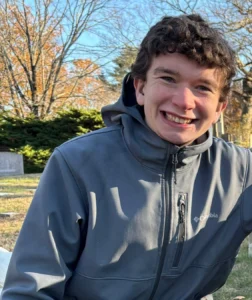By Patrick Healy ’26, Originally Published in HLS ‘Clinic Stories’
The Veterans Law and Disability Benefits Clinic counts for three credits on my transcript, but it also satisfies three things that drew me to the legal profession: learning skills that could help my family, serving people in need, and doing both with like-minded colleagues.

For my 1L elective, I took Trusts and Estates with Professor Robert Sitkoff. In addition to teaching us estate planning doctrine, he pushed us to think about private law. He pointed out that while many Harvard Law students think about public law—like criminal and administrative law—most lawyers do private law, working with individuals to manage their private relations and property. While I do aspire to work in the former, I wanted to come out of law school at least being able to speak the language of the latter, in order to tangibly help the people in my life. Professor Sitkoff’s encouragement reminded me of that goal. That’s why I was intrigued when I heard about the Legal Services Center’s Estate Planning Project, and when I learned that it was housed in the Veterans Law and Disability Benefits Clinic, I knew that it would be a great opportunity.
One of the most important people in my life was my grandfather, who served in the Air Force during the Korean War. While I’ll never be able to repay him, I know he’d be happy that I’m assisting veterans like him. This semester, I worked with an Air Force veteran who wanted to draft an entire estate plan so that her affairs are in order for her family and her beloved dog taken care of. I was also able to assist a Navy veteran, drafting a durable power of attorney and a health care proxy that would allow his wife to better take care of him.
Learning their life stories isn’t only interesting and important, as it is for any kind of attorney-client relationship, but vital because estate plans should reflect each person’s unique background and goals. While estate plans can technically be made without legal assistance, as I saw in Trusts and Estates, this can cause issues when everyday language doesn’t match the precise legal language expected by legal actors, and so the Estate Planning Project helps to turn clients’ goals into the language of the law.
An unexpected benefit of the clinic is how much I work with my classmates. Though we each have our own cases, we meet weekly with both our practice group and clinic seminar, and two of our seminar meetings are with the whole Legal Services Center. My classmates’ thoughtfulness, creativity, and joy in working through each other’s cases gives me hope for what we as a generation of lawyers can accomplish as well as a concrete vision for the kind of workplace I want to be a part of. Their skill and compassion—and our supervisors’ trust in us—make me forget that we are still only student attorneys. Speaking of our supervisors, they are top-notch attorneys and people who could be doing anything but choose to spend their time teaching us. They make us feel like equals and push us to make decisions ourselves while ensuring we have everything we need to do so.
Next semester, I will continue in the Estate Planning Project, where I hope to continue working with my supervisors, clients, and classmates. My work this semester has also inspired me to attend the spring break pro bono trip to North Carolina, where we will help residents recovering from the storm, along with other legal assistance, replace lost estate planning documents. As with much of life, I hadn’t expected my law school path to take this direction but, like an estate plan, my time in the clinic has prepared me to take advantage of unexpected circumstances and given me other options in case my original career aspirations change.
